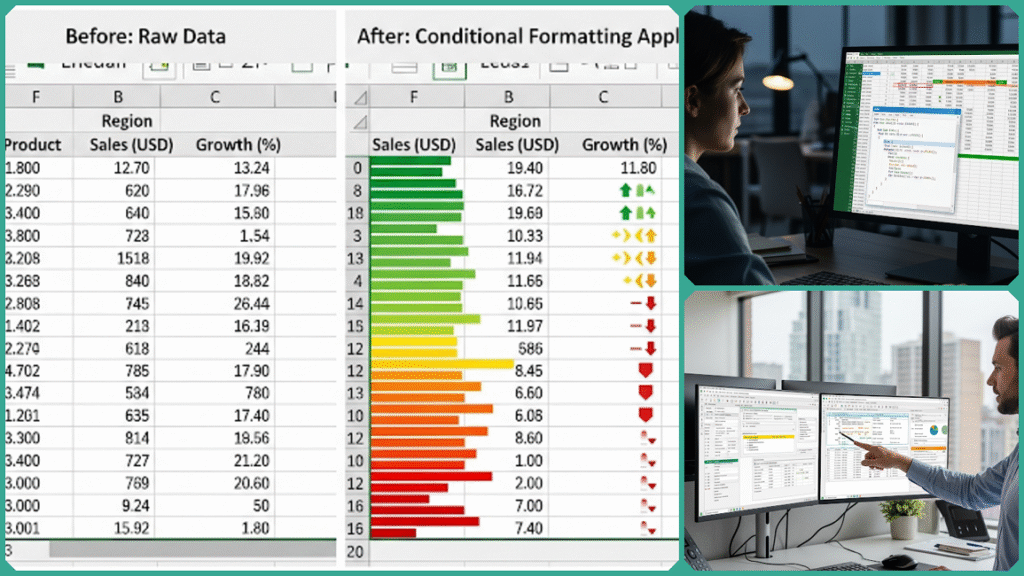Beyond VLOOKUP: Top Excel Skills Employers Are Looking For
Estimated reading time: 17 minutes
Microsoft Excel remains a vital and foundational tool in the professional world, essential across diverse industries such as finance, marketing, project management, and beyond. Professionals often develop expertise by mastering core functions like SUM and VLOOKUP, which form the foundation for advanced data analysis and manipulation.
However, employers in today’s competitive job market are increasingly searching for candidates who possess more advanced and versatile Excel skills, skills that go beyond basic functions and enable them to transform raw data into clear, actionable insights quickly and efficiently.

Whether you’re an aspiring graduate, job seeker, current employee aiming for promotion, or career changer, understanding and mastering these top Excel skills can significantly advance your career prospects and workplace value.
This article thoroughly exposes the frequently overlooked gap that exists between what people commonly perceive as Excel proficiency and the truly advanced, sophisticated skills that employers will highly value and actively seek in the year 2025. Readers will gain clear, detailed insights into the essential Excel capabilities that go far beyond basic functions like VLOOKUP.
Additionally, the article provides a practical and well-structured roadmap designed to help individuals systematically build, develop, and effectively showcase these advanced skills. By following this guidance, readers will be able to position themselves as indispensable and highly sought-after assets in competitive, data-driven roles across various industries.
Core Concepts of Advanced Excel Skills
Beyond merely entering data and crafting basic formulas, true Excel proficiency is about mastering a wide range of powerful tools that enable you to transform, analyze, and visualize data efficiently and effectively.
We will delve into the essential concepts and techniques that set apart an average user from a highly skilled data-savvy professional, equipping you with the skills to handle complex data with confidence and precision.
Moving Beyond Basics
Many professionals start their Excel journey by mastering simple functions like SUM, AVERAGE, and VLOOKUP, the latter being widely used for looking up values vertically within tables. While these formulas serve foundational purposes, they represent only the entry-level proficiency that employers expect today.
The professional landscape today demands significantly more from individuals, requiring Excel users to effectively and confidently handle, transform, analyze, and visualize large and complex datasets with a high degree of sophistication and efficiency.
Advanced Excel skills go far beyond just basic data retrieval or simple calculations; they include a broad and diverse range of tools and techniques designed to help users automate repetitive tasks efficiently, uncover hidden patterns within complex datasets, prepare clean and well-organized data sets, and create insightful visualizations.
These capabilities are essential for making well-informed and thoughtful decisions that are grounded in accurate, reliable, and meaningful data analysis. Having these skills ensures that decisions are not just based on intuition but are supported by a comprehensive and precise examination of relevant data.
Key Excel Tools and Functions
While foundational skills are undeniably important, a true Excel professional goes beyond the basics by leveraging a specialized set of advanced tools and versatile functions designed to tackle complex and intricate data challenges effectively.
We will thoroughly explore the essential features and capabilities within Excel that can significantly streamline your workflows, boost your productivity, and unlock powerful, actionable insights from your data that might otherwise remain hidden or overlooked.
VLOOKUP / XLOOKUP
- VLOOKUP has long been the staple formula for vertical data lookup, but it comes with limitations such as the inability to look leftwards and reduced flexibility.
- Enter XLOOKUP, which offers more robust and intuitive lookup capabilities, including bi-directional search, exact and approximate matches, and simplified syntax. XLOOKUP is quickly becoming the preferred choice for advanced Excel users, given its versatility and ease of use.
PivotTables
- PivotTables are dynamic, interactive summaries that allow users to instantly aggregate, filter, and analyze large datasets.
- They enable the extraction of patterns, trends, and comparisons by letting you group and slice data by various dimensions without manually writing complex formulas.
Mastering PivotTables means acquiring the powerful ability to quickly and efficiently generate meaningful insights from raw data—a highly valuable and essential skill that recruiters and managers consistently seek and greatly appreciate in candidates and employees.
Power Query
- Power Query has revolutionized how users approach Excel data workflows by providing powerful data import, transformation, and cleaning capabilities.
- It connects to diverse external sources (databases, CSVs, web data), automates repetitive data shaping steps, and loads well-structured data into Excel sheets or data models.
This tool greatly minimizes the need for manual intervention, thereby ensuring data handling processes that are far more accurate, consistent, and repeatable. This level of reliability is especially crucial when dealing with large-scale or complex datasets that may be messy or unstructured, where precise and dependable data management is essential for successful outcomes.
Advanced Formulas
- Beyond basic formulas, advanced users rely on sophisticated functions such as:
- INDEX-MATCH (and INDEX-MATCH-MATCH) for flexible lookups,
- SUMIF/SUMIFS for conditional summing,
- IFERROR for error handling,
- Array formulas, which perform multiple calculations on one or more items in an array,
- Logical operators and nesting multiple functions to build robust data models.
These powerful formulas enable much deeper and more advanced data manipulation, allowing users to create highly customized calculations tailored specifically to their unique needs. Additionally, they contribute significantly to building error-resistant spreadsheets that minimize mistakes and improve overall data accuracy and reliability.
Macros & VBA (Visual Basic for Applications)
- Macros and VBA allow users to automate repetitive and complex tasks by recording sequences or writing scripts.
- This skill dramatically improves efficiency and accuracy, enabling tasks like bulk data updates, report generation, and user interface customization.
It also distinguishes users by incorporating an additional layer of programming within the well-known and widely used Excel environment, making it particularly appealing to employers who are actively looking for ways to implement process automation.
This added functionality not only significantly enhances user capabilities but also effectively streamlines workflows, thereby greatly increasing overall efficiency and productivity in a wide range of professional settings and environments.
Conditional Formatting
- This feature helps visually highlight data points based on specific criteria, making it easier to interpret large data sets at a glance.
- Advanced users extend this capability to create dynamic heatmaps, progress bars, or color scales, which aid in quick decision-making processes.
Effective and strategic use of conditional formatting significantly enhances the overall presentation and communication of important data insights, making complex information easier to understand and more visually appealing.
By applying conditional formatting thoughtfully, users can highlight key trends, identify critical values, and draw attention to specific data points that require immediate focus, thereby improving data-driven decision-making processes.
Data Simulations
- Techniques such as Monte Carlo simulations use random data to forecast potential outcomes under various scenarios.
- This is particularly essential in fields like financial modeling, project risk assessment, and operational forecasting.
Having proficiency in these simulations clearly demonstrates a strong ability to perform predictive analytics and scenario planning, skills that are highly prized and sought after in many data-centric roles across various industries. This expertise highlights a capacity to analyze complex data sets and anticipate future trends effectively.
In Summary
By mastering these core competencies, Excel users transcend the basic task of data entry and retrieval, evolving into proficient data analysts and problem solvers. These advanced skills provide the capacity to manage, automate, analyze, and visualize data at scale, aligning with the complex demands of modern workplaces.
Professionals who invest in building these abilities position themselves as invaluable contributors capable of turning raw data into meaningful business insights—skills that employers in 2025 and beyond are actively seeking.
Current Trends and Developments in Excel Usage
Beyond just being a powerful spreadsheet, Excel is constantly evolving with new tools and features that are changing how we work with data. The latest trends show a clear focus on AI integration, automation, and enhanced collaboration.
We will take a closer look at these exciting developments and examine in detail how they are transforming Excel into an even more dynamic, versatile, and indispensable tool that meets the evolving needs of modern professionals across various industries and job roles.
In-Demand Excel Skills in 2025
Despite the surge of sophisticated data tools and platforms, Microsoft Excel remains the most widely used productivity software in businesses around the globe. Research from GoSkills reveals that 29% of Learning & Development decision-makers consider Excel a critical skill for employees, particularly those working in data-intensive roles.
This enduring relevance is not limited to traditional clerical or administrative positions; it extends to engineering, finance, data analysis, marketing, and management domains where effective data management and analysis are vital.
What Employers Expect
Modern employers look beyond simple formula knowledge. They prioritize candidates who demonstrate practical mastery of advanced Excel functionalities that can handle complex datasets and produce actionable insights swiftly and accurately. These skills include:
- Power Query: As the volume and diversity of data explode, Power Query has become a must-have skill. It enables users to efficiently connect, clean, and transform data from numerous external sources. This ability reflects the growing importance of managing “big data” without overwhelming manual effort or error risks.
- PivotTables and Advanced Charting: PivotTables empower users to summarize and dissect data interactively, uncovering meaningful patterns and trends with just a few clicks. Coupled with advanced charting techniques, these tools allow for enhanced visual storytelling, making complex data accessible and understandable to decision-makers.
- Complex Formulas: The legacy VLOOKUP, though still foundational, is increasingly being replaced by XLOOKUP for its superior flexibility and precision, such as the ability to look in any direction within a table. Other advanced functions essential for today’s roles include INDEX-MATCH, SUMIFS, and array formulas that enable dynamic, powerful data analysis.
- Automation with Macros and VBA: Repetitive data processing tasks consume valuable time and introduce error potential. Mastery of Macros and VBA scripting allows users to automate these routines, boosting productivity and enabling focus on higher-value activities. Employers prize candidates with automation skills as they contribute to operational efficiency and consistency.
- Data Simulations and Forecasting: For industries relying heavily on predictive analytics, such as finance and operations, Monte Carlo simulations and other scenario analysis techniques allow professionals to forecast uncertainties and model risks effectively. This advanced analytical capability is increasingly expected in roles that drive strategic business planning.
Excel’s Expanding Role in SEO and Digital Marketing
Excel’s utility is not limited solely to traditional data-heavy sectors; its remarkable versatility has propelled it into a variety of emerging fields such as digital marketing and SEO analytics. In these modern areas, Excel plays a crucial role and is instrumental for a range of important tasks, including:
- Data Cleaning: Digital marketing produces an enormous volume of data, ranging from detailed campaign performance metrics to extensive web traffic logs. This data must undergo thorough cleansing and validation processes to ensure its accuracy and reliability before any meaningful analysis can be conducted. Proper data cleaning is essential to eliminate errors, inconsistencies, and duplications, thereby enabling marketers to make well-informed decisions based on precise information.
- Regression Analysis: Marketers frequently utilize Excel to conduct detailed statistical analyses that assist in comprehensively understanding the complex relationships between different variables. For example, they might analyze how variations in marketing spending influence the overall return on investment, enabling more informed decision-making based on data-driven insights.
- Keyword Tracking: Effectively managing extensive keyword lists and continuously efficiently monitoring SEO rankings requires the use of specialized Excel functions and well-designed templates. These tools help streamline the process, making it easier to organize large amounts of data and track changes over time with greater accuracy and speed.
- Automated Reporting: Utilizing scripting and formula-driven workflows enables digital marketers to efficiently automate the entire process of generating and distributing detailed performance reports. This automation not only saves a significant amount of time but also enhances the consistency and accuracy of the reports produced, allowing marketers to focus more on strategic analysis and decision-making rather than manual report preparation.
This crossover into new and diverse domains clearly underscores Excel’s enduring adaptability and remarkable versatility, highlighting why possessing deep, multifaceted Excel skills continues to significantly enhance one’s overall professional appeal and value in the workplace.
In Summary
In 2025, Excel’s role is expected to evolve as users are expected to utilize it not just as a spreadsheet tool, but as a comprehensive data management and analysis platform. From Power Query’s advanced data transformation to PivotTables’ rapid summarization, from automated task handling with Macros and VBA to predictive simulations and digital marketing analytics, these skills define the new Excel proficiency standard.
Professionals equipped with these valuable competencies can maximize their relevance and overall performance across a wide and diverse professional spectrum, making continued investment in learning and mastering Excel not just beneficial but essential for career growth and success.
Practical Roadmap to Mastering Excel Skills Employers Value
Knowing the essential skills is just the very first step in your journey. The real and more demanding challenge lies in developing a practical and effective strategy that will allow you to truly master these skills.
We will offer a detailed and clear roadmap, complete with actionable steps and valuable resources designed specifically to help you bridge the gap between your current level and the level required to impress potential employers effectively.
| Skill Area | Description | Recommended Learning Focus |
|---|---|---|
| Power Query | Connect, transform, and prepare data from external sources | Learn techniques for data import, transformation, and cleansing to handle large, diverse datasets efficiently |
| PivotTables | Summarize, analyze, and visualize complex datasets | Practice building dynamic PivotTables to extract actionable insights and create compelling data summaries |
| XLOOKUP | Flexible data lookup function replacing VLOOKUP | Understand the syntax and explore flexible lookup scenarios that XLOOKUP enables to enhance data retrieval |
| Advanced Formulas | Functions like INDEX-MATCH, SUMIFS, IFERROR, and array formulas | Master combining these functions for robust, error-tolerant data handling and complex calculations |
| Conditional Formatting | Highlight values based on criteria | Apply conditional formatting rules to enable quick and effective visual segmentation of key data points |
| Macros/VBA | Automation and scripting within Excel | Learn how to record macros and develop basic VBA programming skills to automate repetitive tasks and improve efficiency |
| Data Simulations | Forecasting and predictive analytics using simulations | Gain knowledge of Monte Carlo simulations and scenario modeling for predictive analytics and risk assessment |
By systematically working through this checklist, professionals develop a strong breadth and depth of Excel capabilities that distinguish them in hiring assessments and performance evaluations. Mastery of these skills not only improves day-to-day job efficiency but also positions individuals as valuable assets able to leverage data for impactful decision-making.
This comprehensive roadmap offers a clear and detailed learning pathway that is thoughtfully aligned with the evolving expectations and requirements of employers in the year 2025 and well beyond that timeframe.
Personal Anecdote: Bridging My Knowledge Gap
Early in my career, I believed that mastering VLOOKUP and basic charting was enough to call myself proficient in Excel. Like many professionals, I saw these skills as the gold standard—until I stepped into a more data-intensive role that challenged my assumptions.
Almost immediately, I encountered the limitations of relying solely on basic functions when faced with large, messy datasets and complex analytical tasks. Data preparation became a time-consuming bottleneck, and extracting meaningful insights from raw tables felt frustratingly slow.
Discovering Power Query was a game-changer. It transformed how I imported and cleaned data from various sources, reducing hours of manual effort into a few automated steps. With PivotTables, I unlocked the ability to dynamically summarize and analyze data sets—revealing trends and patterns I had previously missed with traditional formulas.
Moreover, learning to automate routine reporting through the use of advanced Macros has significantly enhanced my team’s overall efficiency and productivity. This valuable skill has allowed us to save a considerable amount of time, enabling us to redirect our energy and attention towards more strategic initiatives rather than spending countless hours on repetitive, time-consuming tasks.
This journey from basic to advanced Excel skills profoundly enhanced my job performance. More importantly, it accelerated my career growth, leading to promotions and salary increases. It reaffirmed an important lesson: in today’s data-driven workplace, the value of Excel expertise goes far beyond knowing VLOOKUP—it’s about mastering tools that empower smarter, faster decision-making.
This narrative draws directly from real-world experience, making it highly relatable and deeply motivating for readers who are looking to identify and bridge their own gaps in Excel skills. It serves as an inspiring example for those eager to improve and advance their capabilities in Excel.
FAQs
Is VLOOKUP still relevant for professionals?
VLOOKUP remains foundational, especially in legacy spreadsheets. However, XLOOKUP is increasingly preferred for its flexibility, ease of use, and ability to look in any direction within tables, making it more powerful for modern Excel users.
How important are PivotTables compared to formulas?
PivotTables provide interactive, fast summarization of large datasets, offering capabilities far beyond static formulas. They are essential for quickly extracting and visualizing insights from complex data, which is why employers highly value proficiency in PivotTables.
Can I learn these advanced skills without formal training?
Many online learning platforms provide a wide range of targeted courses specifically designed to enhance advanced Excel skills, including powerful tools such as Power Query, PivotTables, and VBA programming. Engaging regularly and consistently in hands-on practice using real-world datasets is essential for developing true mastery and building strong confidence in these complex Excel functionalities.
Do these skills apply across industries?
Advanced Excel skills are highly sought after and in great demand across a wide range of industries, including finance, marketing, operations, human resources, project management, and many other professional fields. These skills empower professionals by enabling them to analyze and interpret complex data sets, thereby making well-informed, data-driven decisions in a much more efficient and effective manner.
How do Excel skills impact salary and promotion?
Certified advanced Excel skills can increase promotion chances and earnings by an average of 12% compared to non-certified peers. In specific roles like data analyst, financial analyst, or business intelligence, Excel proficiency can contribute to salaries ranging from $70,000 to over $110,000 annually (U.S. market). Employers highly prize Excel expertise as it enhances productivity and decision quality, making skilled Excel users more valuable and promotable.
In Conclusion
Excel continues to be a powerful and indispensable tool for professionals aiming to add significant value through data-driven decision-making. While foundational skills like VLOOKUP lay the groundwork, employers in 2025 increasingly seek candidates proficient in advanced Excel features such as Power Query, PivotTables, XLOOKUP, Macros, and data simulations.
Mastering these essential capabilities not only significantly boosts overall operational efficiency but also greatly deepens analytical insight, providing a more comprehensive understanding of data trends and patterns. Additionally, it enhances business intelligence by enabling more informed decision-making processes and strategic planning for long-term success.
Building competence in these advanced areas offers a clear roadmap to stand out in competitive job markets and unlock career growth opportunities. Research shows that professionals with advanced Excel skills earn 5-15% more, with some specialized roles enjoying even larger salary premiums, and have greater promotion prospects.
Advanced Excel mastery also positions individuals as indispensable contributors who can automate repetitive tasks, analyze complex datasets, and provide strategic insights, all highly prized in today’s workplace.
Embracing the challenge of bridging the Excel knowledge gap is an investment that delivers exceptional returns throughout one’s professional journey. Whether aiming for a new job, a promotion, or a career transformation, elevating Excel skills remains a consistent career accelerator.
Which advanced Excel skills have significantly transformed your work efficiency or positively impacted your career growth and development?
Share your personal experiences and your all-time favorite tips in the comments section down below! Don’t forget to use the hashtag #ExcelBeyondVLOOK to become part of the ongoing conversation and connect with a community of others who are also working hard to advance their Excel skills and expertise.
Discover more from Skill to Grow
Subscribe to get the latest posts sent to your email.






